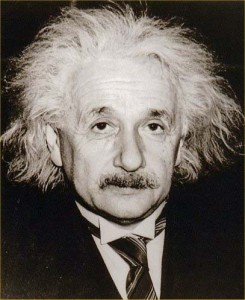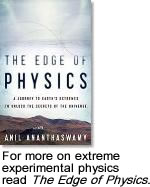Einstein’s Greatest Blunder: Was it, really?

IN an enlightening paper that appeared recently on the physics archive, physicists Carlo Rovelli and Eugenio Bianchi take on our prejudice against the so-called cosmological constant (aka dark energy), arguing that the popular notions about it are actually misconceptions.
Dark energy is the energy inherent in the fabric of spacetime, and is thought to be causing the expansion of the universe to accelerate. The equations of general relativity have a term in them (denoted by the Greek letter lambda) for the energy of spacetime.
In fact, Einstein himself drawn attention to lambda in general relativity, and was later to call it his biggest blunder. Rovelli and Bianchi, while pointing out this is indeed true, argue that the popular understanding of why Einstein so regarded lambda is erroneous.
The equations of general relativity were showing Einstein that spacetime had to be either contracting or expanding. But at the time we thought we lived in a static universe. Einstein showed how lambda could be used to get a universe that was neither expanding nor contracting. Then, faced with the evidence of an expanding universe from Edwin Hubble’s observations with the 100-inch telescope atop Mount Wilson in California, Einstein retracted.
But did he call lambda his biggest blunder because it spoiled the beauty of his equations? Or was the great man acknowledging a unique mistake in a glittering career? Nothing of the sort, say Rovelli and Bianchi.
Between 1912 and 1915, Einstein had published all sort of wrong equations for the gravitational field – not to mention articles that are mathematically wrong, as Einstein himself later conceded. He later corrected his wrong equations and wrong conclusions, and never thought that a physically wrong published equation should be thought as a ‘great blunder’.
So, why this emphasis on the cosmological constant as his “biggest blunder”, if he never really considered other mistakes as blunders, but just part of the process of doing science?
The reason, say Rovelli and Bianchi, is that Einstein had been “spectacularly stupid” in his otherwise glorious early work in cosmology. Had he been courageous enough to face up to his own equations, he could have predicted a contracting or expanding universe, well before Hubble actually discovered galaxies that were racing away from us.
The man who had the courage to tell everybody that their ideas on space and time had to be changed, then did not dare predicting an expanding universe, even if his jewel theory was saying so.
But more importantly, Einstein did not introduce lambda specifically for predicting a static universe. He had shown in a 1916 paper that the equations of general relativity are not the most general possible, and that there could be an additional term (lambda) which would make the equations even more general (this appears in the footnote of the paper, along with first usage of the term lambda).
Crucially, Einstein had to fine-tune the value of lambda in order to realize a stable and static universe. He chose lambda to be exactly equal to the energy density of matter in the universe. Physicists hate fine-tuning, preferring to derive explanations for why constants have the value they do.
The point here is that the term lambda was not Einstein’s biggest blunder. It was his misuse of it. Again, over to Rovelli and Bianchi:
[Einstein] chose to believe in the fine-tuned value…and wrote a paper claiming that his equations were compatible with a static universe! These are facts. No surprise that later he referred to all this as his ‘greatest blunder’: he had a spectacular prediction in his notebook and contrived his own theory to the point of making a mistake about stability, just to avoid making… a correct prediction! Even a total genius can be silly, at times.



0 comments
Kick things off by filling out the form below.
You must log in to post a comment.